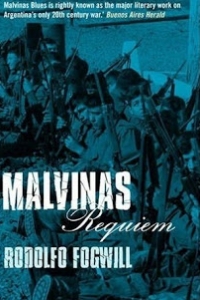Rodolfo Fogwill: Malvinas Requiem
Author: Rodolfo Fogwill
Title: Malvinas Requiem
ISBN: 1852429658
Pages: 154
In the twenty-five years since its end there has been plenty of published material about the Falklands conflict, most of it memoir dominated non-fiction. Malvinas Requiem by Argentinean writer and media figure Rodolfo Fogwill is the first fictionalised account I’ve read, and indeed, the first I’ve even heard of, from those who would refer to the Falkland Islands as ‘Islas Malvinas’.
The story centres on a group of young Argentinean conscripts, who have deserted to set up their own community in a cave high amongst the mountains surrounding the islands capital, Port Stanley. Theirs is a brutal and basic existence as they try to sit out the final few weeks of the war. The risk of being shot or imprisoned forces them to stay underground in cramped conditions during the daylight hours, making an outbreak of diarrhoea particularly unwelcome.
Provisions are bolstered by nightly bartering with soldiers from both sides, as the booty from corpse robbing is exchanged for food and torch batteries. Order is maintained by ‘The Four Kings’, self appointed leaders of the group, whose ruthless determination to survive results in those injured or deemed the weakest, being handed over to the British, or in some cases, left outside overnight to freeze to death.
“It was one of the rare mornings when the sun shone, and you could glimpse the green grass and the English-style houses in the distance. ‘This is theirs,’ he thought. ‘They can keep it.’ You had to be British, or like the British, to want to come and freeze your arse off here, when over there lay Argentina, so fine and wide and with the sun shining down on it.”
A dark humour hangs over the group as they pass time by telling stories, discussing life back in Argentina, and the political mistakes that have led them to their current situation. It’s that criticism of the Argentinean military dictatorship that caused the book to make waves when it was first published and led Fogwill to become one of the leading advocates of democracy in his country. For not only is there little sentiment shown in this story, there is little enthusiasm for the cause either. These are merely young men trying to survive and return home.
“The dillos had plenty of time in between shifts of digging. They always dug in the morning, so that the wind would cover the noise of falling rocks. They talked together.
‘What do you want?’
‘A shag.’
‘Sleep.’
‘A good bath.’
‘To be home.’
‘To sleep in laundered white sheets.’
‘Have a shag.’
‘To have a decent meal… Think about that grilled beef…’
‘See my folks.’
They couldn’t believe it. They checked:
‘Your folks?’
‘Yes, and then a shag and a bath,’ said the one who talked about his old folks at home, to cover his embarrassment.”
But as you progress through the book, more and more of the described events start to grate. From the factually inaccurate: large numbers of British soldiers being transported by helicopter. To the barely plausible: a British soldier using the cave as a lookout post is killed but subsequently replaced by his commander without comment or retaliation. To the libellous: large scale rape, torture and murder of Argentinean POW’s. To complete fantasy: Nuns seen wandering the mountains, formations of planes disintegrating in mid-air and the deserters keeping a large tapeworm as a pet.
It’s two thirds of the way through before the nature of this unreliable narrator starts to become more apparent, as it’s at this point that the narrative suddenly switches into first person. So suddenly, that I had to re-read this scene several times to realise the story was now being told by the sole survivor of the group to an increasingly sceptical journalist. From this point on, the boundary between what was fictionalised reality and what was pure fantasy had become so blurred that I lost trust in the story and eventually started to lose interest in it as well. Others may like this technique, but I was enjoying the feeling that what I was reading had at least some degree of authenticity.
Overall, Malvinas Requiem is an interesting, well-written book and one worth seeking out for a ‘view from the other side’. This edition could be improved with a forward that puts its story into context – readers should at least know it was published before the end of the war. Decent footnotes to explain references to Argentinean politics are another serious oversight.
The back cover makes a comparison to Catch-22, which in my opinion is overplayed. As whilst the tone and dark humour of the two books are similar, Fogwill simply isn’t in the same league as Heller, at least on the evidence of Malvinas Requiem – a book with potential for greatness that it never quite achieves.


[…] in him an heir to Artl. I’ve heard mention of him, particularly for Malvinas Requiem, reviewed here. […]
Argentinean Literature - World Literature Forum said this on 10 July, 2008 at 2:51 pm |